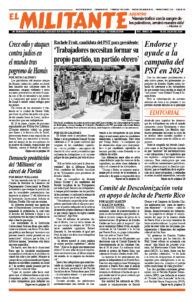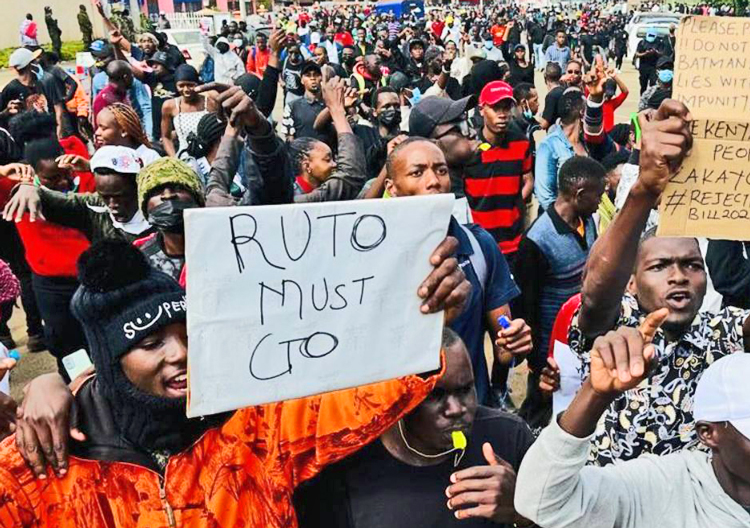Protests erupted across Kenya June 25, with tens of thousands of mostly young demonstrators pouring into central Nairobi, the country’s capital, as the government passed legislation jacking up taxes on eggs, bread, sugar, cooking oil, diapers and other necessities.
When part of the crowd stormed the Parliament building, the police opened fire with tear gas and live bullets, killing at least 17 and wounding more than 300. Another 22 were killed in demonstrations in other cities. Calling the protesters “treasonous,” Kenyan President William Ruto deployed the military on the city’s streets. Hundreds were arrested.
The bill, intended to bring in $2.7 billion, was one of a series of measures Kenya’s rulers have taken to raise money to avoid defaulting on $80 billion in loans, a figure that accounts for nearly three-quarters of Kenya’s entire annual economic output.
The crisis unfolding for Kenya’s capitalist rulers today is a reality throughout Africa and former colonial countries worldwide. To grow, they’ve become increasingly indebted to international lenders like the World Bank, the International Monetary Fund, Washington and other imperialist powers, and, more recently, to the rulers of China.
Nairobi began taking out bigger and bigger loans in the early 2000s to cover the costs of infrastructure projects, including roads, railways, dams and rural electrification. The cost of servicing that debt soared as interest rates grew with the set of new loans. Debt service cost Kenya’s government over 600 billion shillings ($4.65 billion) by the end of 2023.
This indebtedness was exacerbated by growing worldwide instability, including Moscow’s invasion of Ukraine, the unfolding effects of Hamas’ murderous pogrom against Jews in Israel, the COVID pandemic and more. Interest payments now eat up 27% of Kenya’s tax revenue.
Unpayable debt
More than half the people in Africa live in countries whose governments spend more on interest payments than they do on health or education.
As images flashed on TV screens worldwide showing wounded people sprawled on Nairobi’s streets, Ruto reversed course June 26, saying he would instead look at imposing austerity by trimming government spending — from wages to social services — as demanded by the IMF.
The demonstrations continue, with protesters outraged by the police violence and demanding Ruto resign. Since taking office in 2022, his administration has increased taxes, scrapped subsidies and raised electrical rates. Deep anger remains over the steep rise in living costs, widespread corruption and lack of jobs.
Washington claims to be “shocked” and “deeply concerned” by the brutality of Kenya’s police. Only a month before the shootings in Nairobi, President Joseph Biden feted Ruto at a lavish White House state dinner attended by top government officials and former U.S. Presidents William Clinton and Barack Obama.
The U.S. rulers looked to Ruto’s forces to help in their efforts to tamp down lawlessness and crisis conditions in Haiti. On June 24 the first contingent of 400 Kenyan police officers arrived there on a “security mission” largely financed by Washington. Biden designated Kenya a “major non-NATO ally of the U.S.,” with plans to expand joint security operations and increase Kenya’s access to U.S. weapons.
In the 1980s Fidel Castro, the leader of the Cuban Revolution, spoke out against the foreign debt saddling the people of the neo-colonial world. “The amount wrenched away from our peoples in just the last few decades through unequal terms of trade, high interest rates, protectionism, dumping, monetary manipulations, and the flight of capital is much greater than the total amount of the debt,” he said in 1985.
“The riches and well-being of which we have been deprived through the imposition of economic dependence and underdevelopment cannot even be estimated, let along measured. It is our peoples who, by right, are the creditors of the rich and industrialized Western world, both morally and materially.”


